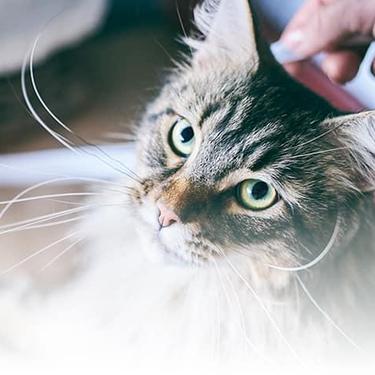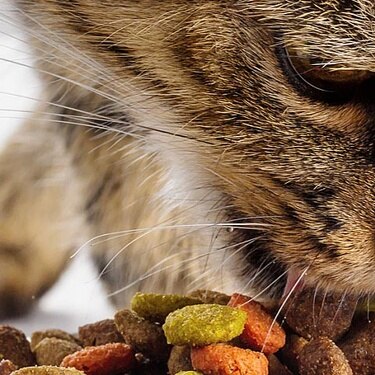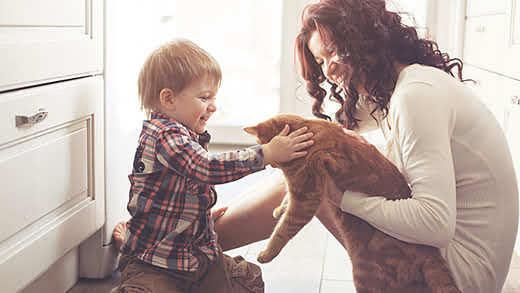
-
Find the right food for your petTake this quiz to see which food may be the best for your furry friend.Find the right food for your petTake this quiz to see which food may be the best for your furry friend.Featured products
 Mature Adult Dog Food
Mature Adult Dog FoodHill's Science Plan Mature Adult Multipack Wet Dog Food with Chicken & Beef are complete premium pet foods for mature adult dogs from 7 years. Your dog will love these deliciously smooth and savoury minced loaves, formulated to deliver the appropriate amount of energy to support the needs of adult dogs.
Shop Now Adult Wet Dog Food with Beef
Adult Wet Dog Food with BeefHill's Science Plan Adult Multipack Wet Dog Food with Chicken, Beef & Turkey are complete premium pet foods for adult dogs from 1 year. Your dog will love these deliciously smooth and savoury minced loaves, formulated for balanced nutrition and overall health.
Shop Now Puppy Food
Puppy FoodHill's Science Plan Puppy Multipack Wet Dog Food with Chicken & Beef are complete premium pet foods for growing puppies from weaning until 1 year old and for pregnant and nursing dogs. Your puppy will love these deliciously smooth and savoury minced loaves, formulated for balanced nutrition and overall health.
Shop NowFeatured products Mature Adult Wet Cat Food with Chicken
Mature Adult Wet Cat Food with Chicken
Tender chicken chunks in gravy for mature adult cats. Made with easy-to-digest ingredients, high-quality protein for lean muscle maintenance and antioxidant vitamins C+E for optimal health.
Shop Now Light Adult Multipack Wet Cat Food with Chicken & Ocean Fish
Light Adult Multipack Wet Cat Food with Chicken & Ocean FishTender chicken chunks in gravy for cats, with L-carnitine and fewer calories for ideal weight management. Packed with high-quality protein, omega-6s, and vitamin E for shiny fur and healthy skin.
Shop Now Adult Multipack Wet Cat Food with Beef, Ocean Fish & Chicken
Adult Multipack Wet Cat Food with Beef, Ocean Fish & ChickenTender chunks in gravy for cats, with high-quality protein to maintain lean muscle. With vitamin E and omega-3s & -6s for healthy skin and balanced minerals to support healthy vital organs.
Shop Now -
Dog
- Dog Tips & Articles
-
Health Category
- Weight
- Food & Environmental Sensitivities
- Urinary
- Digestive
- Joint
- Kidney
-
Life Stage
- Puppy Nutrition
- Adult Nutrition
- Senior Nutrition
Cat- Cat Tips & Articles
-
Health Category
- Weight
- Skin & Food Sensitivities
- Urinary
- Digestive
- Kidney
-
Life Stage
- Kitten Nutrition
- Adult Nutrition
Featured articles Show some love with wet foods: a great choice for pets with health issues
Show some love with wet foods: a great choice for pets with health issuesShow some love with wet foods: a great choice for pets with health issues.
Read More The Incredible Science Behind Your Pet's Microbiome
The Incredible Science Behind Your Pet's MicrobiomeLearn what your pet's microbiome is, how it contributes to your pet's gut and overall health, and why nutrition is important in maintaining healthy microbiomes.
Read More The Right Diet For Your Pet
The Right Diet For Your PetIn people, the right diet is very important. If you are eating the wrong way for your metabolism, activity level, age and lifestyle you could end up with health issues.
Read More -


Are you thinking about adopting a feline friend, but wondering how good cats are with kids? Luckily, many cats are great with children. Here's what to consider when looking for a child-friendly cat to welcome into your family.
Cats and Kids
So, if you're asking if cats are good with kids, you probably have a child at home, or maybe you’re welcoming a new child into the home. Cats and young children can absolutely live safely and happily together if you adopt a cat with the right temperament and manage the environment correctly. The best cats for kids are gentle, friendly and patient. While rumour has it that many cats are cranky, this is often because they are misunderstood. In reality, most cats can make loving pets.
According to the University of Edinburgh, having a pet like a cat can positively influence a child's physical and emotional health, development and wellbeing. Pets provide a great source of comfort to kids and have been shown to help reduce stress and anxiety. A stronger attachment to a pet is also associated with better communication between adolescents and their parents and friends.
Personality Test
To find the cat who will best adapt to your household, you'll want to consider your kids' ages and personalities.
Skittish cats don't tend to fit in well in homes with young children. As the Battersea Cats’ Home explains, timid cats can find these busy, often unpredictable surroundings very stressful to live in. In these cases, your cat might hide or develop problems like urinating outside the litter box. Instead, opt for a cat who is sociable, confident, and not bothered by loud noises.
Though fun, playful and energetic, a kitten usually isn't the best choice if you have an infant or a toddler. Like their human counterparts, kittens require a lot of training. As Cats Protection explains, kittens are still learning to use their claws and may play rough, which could lead to an injury for your little one. Kittens are also likely to be frightened by the unpredictable or loud behaviour of a toddler, who won’t yet understand that the kitten isn’t a fluffy soft toy!
Both young and adult cats with spirited dispositions are great for kids ages four and up, but not necessarily for youngsters three and under. Energetic adult cats may not tolerate the antics of very young children and may lash out if the child disturbs their rest or inadvertently traps them while attempting to interact.
Don't rule out adopting a senior cat. Older cats can make great companions for slightly older children, who will appreciate their desire to curl up on a warm lap and are capable of understanding and responding to the specific needs of a senior cat.


Tasty Tips
Adoption Tips
Include your children in the adoption process, beginning by looking through your local shelter's website and social media pages together. Before deciding on a cat, though, bring the whole family to visit an animal shelter together. It's important to see how your kids and the cat respond to one another.
Ask shelter employees and volunteers lots of questions about the cats you're interested in. Some questions you might want to ask include:
- How does the cat get along with people?
- Are they social or shy?
- Has the cat interacted with children previously?
- Do they exhibit any signs of aggression, fear, or overexcitement?
Specify your family's lifestyle — mellow and quiet, rambunctious and noisy or anything in between — so that the shelter staff can help you find the best cat for your household.
Don't be surprised if the shelter asks you a lot of questions, too. Remember that they care about the welfare of the cats in their care, and want to make sure that your family is the right fit. After all, neither of you wants to be in the sad situation where you have to return the cat to the shelter because they aren't right for your family.
The Best Cats for Kids
The following are a couple of the friendliest cat breeds that will suit a family with young kids:
- The Governing Council of the Cat Fancy (GCCF) says that Siamese cats are loud, outgoing and extroverted. These sociable cats love being part of the family, show incredible loyalty to their humans, and will happily play games with the kids.
- Ragdoll: Known for their easygoing nature, ragdolls love their human families and thrive on interactive play. Since they're so active, they're good for homes with slightly older children. They're also highly adaptable to change.
- Birman: This breed is as gentle and friendly as they get. The GCCF describes Birmans as “wonderful companions with a lot of love to give”. They love to play and are patient and tolerant of kids, making them great family pets. As an added benefit, Birmans have a soft, quiet meow, which means they're less likely to wake your child at bedtime.
While this list gives you a good indication of temperaments based on breeds, know that amazing cats can also be found at a local shelter. Even if you don't know a cat's exact breed, it doesn't mean you can't get a good sense of their personality while you and your kids visit the shelter.
Bringing Home Your Cat
So, we've already established that some cats can be great companions for kid-filled homes, but it is also important to prepare yourself before bringing home your cat. Teaching your kids how to have safe interactions with the cat is extremely important. Give your cat time to get used to their new surroundings. If your cat is super social, great! If they seem unsure at first, be sure to give them plenty of space, including a hideaway of their own. Allow the cat to slowly get familiar with their new housemates to help ease their transition.
Adapting to new surroundings can be stressful for cats and as a consequence, they may develop digestive upset or urinary problems upon arriving home with you. If you notice that your cat is experiencing these issues, talk to your veterinarian to see if there are any underlying health conditions that need to be addressed and if there are treatments that may help.
The time you spend researching the best cats for kids and how to prepare your family for a cat will pay off in a big way when you get to watch your child and kitty form a loving, lasting bond.


Christine O'Brien is a writer, mom, and long-time cat parent whose two Russian Blues rule the house. Her work also appears in Care.com, What to Expect, and Fit Pregnancy, where she writes about pets, pregnancy, and family life. Find and follow her on Instagram and Twitter @brovelliobrien.
Related products

Tender chunks in gravy for cats, with high-quality protein to maintain lean muscle. With vitamin E and omega-3s & -6s for healthy skin and balanced minerals to support healthy vital organs.

Tender chicken chunks in gravy for mature adult cats. Made with easy-to-digest ingredients, high-quality protein for lean muscle maintenance and antioxidant vitamins C+E for optimal health.


Tender chicken chunks in gravy for cats, with L-carnitine and fewer calories for ideal weight management. Packed with high-quality protein, omega-6s, and vitamin E for shiny fur and healthy skin.
Related articles

Chocolate is known to be poisonous for dogs, but it can also be toxic for cats. Learn why chocolate is bad for cats & what to do if she's eaten it.

There are three common ways to feed a cat. Each way has its advantages and disadvantages.

Learn how to make homemade cat treats that are healthy for your pet with this recipe from Hills Pet Nutrition.

From essential vitamins & minerals to different types of meat, learn what to look for when choosing the best cat food for your feline.

Put your cat on a diet without them knowing
Our low calorie formula helps you control your cat's weight. It's packed with high-quality protein for building lean muscles, and made with purposeful ingredients for a flavourful, nutritious meal. Clinically proven antioxidants, Vitamin C+E, help promote a healthy immune system.
Put your cat on a diet without them knowing
Our low calorie formula helps you control your cat's weight. It's packed with high-quality protein for building lean muscles, and made with purposeful ingredients for a flavourful, nutritious meal. Clinically proven antioxidants, Vitamin C+E, help promote a healthy immune system.


